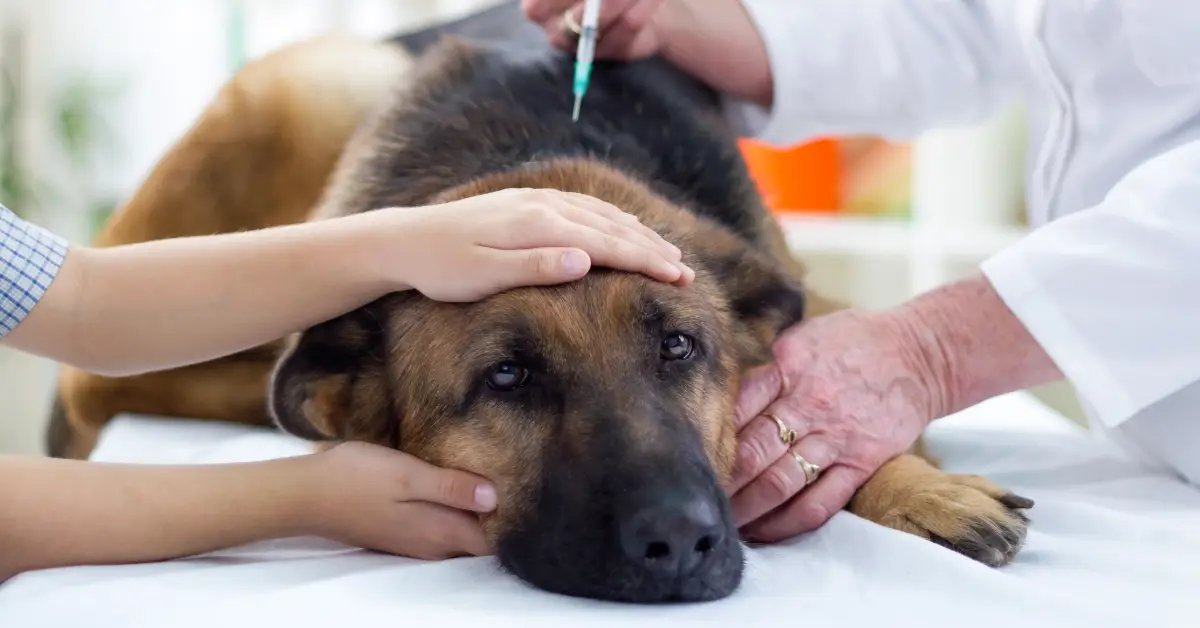Save a Dog With Your Pacemaker – How to Donate

Do you have a pacemaker, or do you know someone that does? If you’re on this site, we already know you love furry friends, and now you can make a difference in a dog’s life. We’re not allowed to donate pacemakers to people, but you may be surprised to find out they can be donated to a dog.
You see, dogs can use pacemakers just like humans, and a human pacemaker works in dogs. Best of all, humans can leave a note in their will to allow the pacemaker to be removed and donated to save a dog’s life. And there are plenty of dogs that need pacemakers.
According to this article, 10% of all dogs and 75% of senior dogs die or suffer from congestive heart failure or heart disease. And studies from the NIH and veterinary clinics across the country share similar stats like this one for senior dogs and this one about heart disease in dogs.
One study from the University of Minnesota showed that 86% of dogs survived up to a year after the pacemaker was installed, with a 65% survival rate three years later. And this study from the NIH showed dogs that have atrial standstill survived 866 days longer because of the pacemakers.
If you’re ready to donate or are curious about whether your pacemaker qualifies, read on.
How to Tell If Your Pacemaker Can Be Donated to a Dog
Whether your pacemaker can be donated depends on a number of factors, including the battery life left and its age. Your doctor and the veterinary clinic you work with can help you understand whether your pacemaker is eligible for donation to a pup.
How and Where to Donate Your Pacemaker to a Dog
There are two common ways people transfer their pacemakers to a dog. The first is to have your will modified so that when you pass away, there are instructions to have it removed and sent to the clinic of your choice. The other is to request your doctor save the pacemaker for donation when yours is being replaced or upgraded.
And the good news, there is no shortage of programs and places you can donate your pacemaker to in order to save a dog’s life:
- Your local veterinary hospital where they perform heart surgeries
- Local animal shelters can provide you with options if they have partnerships with medical facilities
- Colleges and universities with veterinary medicine programs
- Contact your local pet pharmacy to see if they have a list of dogs with heart problems and ask them to email the pet parents
When your pacemaker is no longer needed for your life, see if you can give life to another by donating it to a furry friend!
About the Author: The writing team at Service Dog Certifications is made up of folks who really know their stuff when it comes to disability laws and assistance animals. Many of our writers and editors have service dogs themselves and share insights from their own experiences. All of us have a passion for disability rights and animals.
Related Articles

Benefits of a Raw Food Diet for Dogs
Diet is a very important part of keeping your dog healthy. There have been many articles about dog food made in China that had harmful ingredients. A raw food diet is the most natural and healthiest way to feed your favorite canine. Here are a few arguments about feeding your dog a raw food diet. […]

Read More

Can You Deduct Service Dog Veterinary Bills on Your Taxes?
Yes, service dog vet bills are tax-deductible medical expenses. Food, grooming, training costs, and equipment all qualify, too. The only catch is that your dog needs to be an actual working service dog. Expenses for regular pets and emotional support animals don’t count, no matter how much comfort your animal provides. The government wants proof […]

Read More

Should I Vaccinate My Service Dog?
Yes, you should vaccinate your service dog, as they are required by many state and local laws to be vaccinated, just like a pet dog. Additionally, vaccinations like rabies are required for air travel. Just because your dog is a service dog does not exempt them from vaccinations, unlike it does for pet fees and […]

Read More

I never knew this , I would have had my first one donated when they upgraded mine this year
If the battery was used up I don’t know if they could have used it. Mine will be replaced in about 2 years and I’ll ask my electrophysiologist about it.
My husband has just passed away and I have his pacemaker which I would dearly love to donate to a furry friend. How do I go about this please.
What a wonderful program. My girls have been asked to make sure when I pass to donate my pacemaker. And if I’m still alive when it comes time to replace it I will definitely make sure I ask the doctor to save it.
great idea, I am just wondering who to tell or sign a donation form near the city of Phoenix AZ. My vet in Cooledge AZ. said he has heard of it, but it’s a small town vet clinic and he wasn’t interested in looking into where to sign up or who to tell in my area. Arizona City, Arizona. 85123
I’ve called as far as Ohio State University Cardiac Hospital in Columbus Ohio and they will not take them because of the chance of bacteria and rejection from Human to animal. I went from a pacemaker with more than 10 years on it to a defibrillator and I’d like to see my pacemaker go to a good cause. If anyone can tell me where to actually donate it, I’ll be happy to send it there.
Options included in https://www.usatoday.com/story/news/factcheck/2023/12/08/dogs-can-use-donated-pacemakers-from-humans-fact-check/71851094007/
My friend is on hospice with just a couple of days left. His family wants to donate his pacemaker but I have hit nothing but dead ends trying to find someone to take it. Any help would be appreciated. Today’s date is 5/7/24.
Arlene- did you find any leads on this? My mom just passed so we could donate hers if we can find a recipient. In fact, the funeral home has several from past clients that they could donate!
Arlene- did you find any leads on this? My mom just passed so we could donate hers if we can find a recipient. In fact, the funeral home has several from past clients that they could donate! Todays date 5/18/24
I have read you can donate it to a veterinary hospital 😊
University of Georgia’s College of Veterinary Medicine
https://news.uga.edu/navicent-uga-partner-pacemakers-dogs/
I have a pacemaker and my beloved, self trained Service Doberman has a Vet appointment in a couple weeks. I will ask my Vet if she would accept my Pacemaker upon my death. This is a wonderful thing to know about!
I do pacemaker surgery (implants, upgrades,and removals. We throw out many perfectly good pacemakers. There needs to be anprotocol how to do this. Some go back to the manufacturer but many are tossed into the garbage.
Has anyone found where there is still a program that is taking the Icd implants? (Pacemaker/defibrillator) I just got a new one and my old one has 24 years on it.. and I would love for it to go to a dog in need to help a family
This is great!
I will pass this on to my veterinarian ASAP.
Thank you so much!